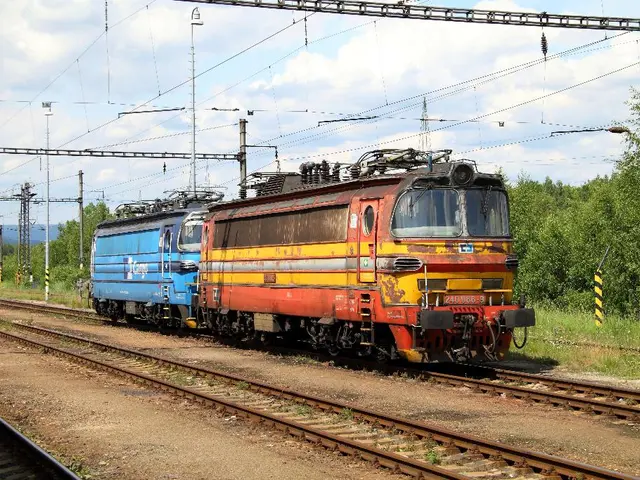Solar Boom and Spain's Blackout: An Expert Weighs In
Is Solarboom potentially involved in the power outage in Spain?
Following the historic power outage in Spain, one expert suggests poor international connectivity and high renewable energy share as the likely culprits.
As Spain and Portugal make their way back to normalcy, the hunt for the causes behind the blackout persists. Red Eléctrica, the Spanish grid operator, points to an abrupt disconnection with France as the primary culprit. However, the motive behind this breakdown remains shrouded in mystery for now.
Enter Spanish energy specialist, Simón Martín, a professor at the University of León's School of Electrical Engineering. According to him, Spain's power crisis originates from two critical weaknesses:
Issue 1: Limited International Connectivity
Martín highlights a longstanding deficiency in Spain's power grid—insufficient international interconnection. This predicament is chiefly due to the geographical barrier of the Pyrenees, limiting Spain to only about 3% of its power plant capacity via cross-border interconnection. By contrast, the EU's goal for 2030 is a 15% connection rate. Reduced interconnection equals fewer opportunities to balance surpluses and deficits in the power grid, a vital requirement for preventing blackouts.
Insight , How Gravity Helps Save Energy: Dive into Pumped Storage
Issue 2: High Renewable Energy Share
Martín maintains that the shift towards renewable energy sources in Spain—which currently account for 60% of generated electricity—is fundamentally reshaping the nation's power generation landscape. Wind and solar power are leading the charge, with hydropower coming in third. Unfortunately, these clean energy sources offer no buffer in the face of fluctuations in the grid, unlike power plants that use heat and store energy in their rotation.
Spanish grid at risk
Given its limited connections with international grids and heavy reliance on renewable energy sources, Spain's power grid has grown increasingly vulnerable, according to Martín. He suspects that a string of mishaps resulted in the extensive power outage on April 28.
There may be a connection with an incident in France's power grid, which triggered a sudden termination of the high-voltage line between the two countries. This change may have amplified Spain's system's instability, which has less interconnection with other nations than France's grid. In addition, the Iberian Peninsula is often referred to as an isolated "power island." Moreover, France heavily relies on nuclear power plants, which have rotating components in their generators that can store energy and stabilize the grid.
Insight Smart Grids and Efficient Energy Use: A Smarter Solution to Power Gaps
These issues surfaced at a crucial moment when solar and wind power plants in Spain, which are inherently prone to fluctuations, were supplying a substantial portion of the country's electricity: "At noon on that fateful day, 73% of the anticipated demand was set to be covered by solar energy, and only 3.3% by wind energy, increasing the likelihood of voltage fluctuations," stated Martín. This voltage drop could have led to a decoupling of solar and wind power plants, perhaps contributing to the system's collapse.
A Rogue Event, or the Beginning of a Pattern?
Although this hypothesis seems likely, it is improbable that this accident will reoccur shortly, Martín assures us. The power flows can now be diverted to alternative lines. However, danger still lurks, and there's no simple solution. A 5000-megawatt connection between Spain and France is in the works, expected to be operational by the end of 2027 and will nearly double the existing exchange capacity.
Insight Next-Gen Energy Solutions: What's in Store for the Future?
Other possible security measures include the adoption of more energy storage systems and the growth of microgrids that can isolate themselves from the main grid during an outage and self-generate electricity through solar panels, small wind turbines, combined heat and power, and batteries. "These advancements will enhance the flexibility and durability of the grid, but they require more technological maturity and strong regulatory support," the expert concedes.
Sources: ntv.de, kst
- Energy
- Renewables
- Blackouts
Further Considerations
- Intermittency and Reliability: While renewable energy sources such as wind and solar are becoming increasingly dependable, particularly when combined with hydroelectric resources, the need for grid stability solutions is crucial to manage renewable sources' variability. This is where energy storage technologies like batteries prove indispensable as "shock absorbers" for the grid.
- Balancing Act: Achieving high levels of renewable energy integration while maintaining a stable and reliable grid requires a delicate balancing act. This necessitates the careful consideration of both the expansion of renewable energy sources and the development of complementary technologies like energy storage.
- Policy Considerations: Spain's goal of achieving 78% renewable electricity by 2030 necessitates careful policymaking to maintain grid reliability while promoting renewable energy growth.
- The unprecedented power outage in Spain is suspected to be a result of two critical weaknesses in Spain's power grid: limited international connectivity and high reliance on renewable energy sources.
- Professor Simón Martín, an energy specialist from the University of León's School of Electrical Engineering, points out that Spain's power crisis stems from an insufficient international interconnection rate and the fluctuating nature of renewable energy sources.
- As part of the efforts to strengthen the power grid, a 5000-megawatt connection between Spain and France is being developed to improve international interconnection and reduce system instability.
- Spanish energy industry experts, like Professor Martín, advocate for the adoption of more energy storage systems and the growth of microgrids to enhance the flexibility and durability of the grid.
- Achieving high levels of renewable energy integration while maintaining a stable and reliable grid requires careful policymaking, including the development of complementary technologies like energy storage, and the management of renewable sources' variability.








